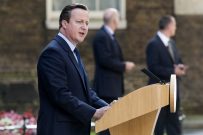Free-for-All in France
The French presidential election is almost upon us. The first round will take place in mid-April and the second in early May. Usually, such campaigns unfold in a way that is more or less predictable. Not this year.
The only thing we know for sure is that the verdict on five years of leadership by the Socialist Party is devastating. Only four percent of the French people think the Socialists did a good job. That’s why François Hollande, the soon-to-be-ex-President, has renounced a run for a new mandate.
On the Left, we see demoralization. Manuel Valls, until a few weeks ago the country’s Prime Minister, is running in the primaries, but he’s the only one standing on the policies of François Hollande. All six of the other Socialist candidates have repudiated them. Anyway, we’ll know the Socialist candidate at the end of this month. The main trouble for this candidate will be that at least two other leftist candidates will run for president. One is Jean-Luc Mélenchon, endorsed by the Communist Party, and the other is Emmanuel Macron, the former Socialist Economy Minister, who wants to promote a ‘center-Left’ policy. At this stage, the Left bloc, which represents around 35 percent of the electorate, appears to be divided in three parts.
This does not bode well. So everybody is looking to the other side of the political chessboard.
We have known since late November that François Fillon will be the candidate of the Right and center-Right. A veteran of French politics, he was first elected to parliament in 1981 and has held many ministerial portfolios. He was, from 2007 to 2012, President Nicolas Sarkozy’s Prime Minister. And he won the primaries against Sarkozy and Alain Juppé, also a former Prime Minister, but more “center-Left” than Sarkozy or Fillon. (Juppé favors leaving a larger place for Islam in French society and is very close to the mufti of Bordeaux, Tareq Oubrou, an associate of the Muslim Brotherhood.)
Fillon has the image of a strong conservative. But the policies he supported in the past were not very conservative. So, the first uncertainty of the campaign lies here: will François Fillon promote a conservative program (both socially and economically) or will he soften his political pitch to seduce the centrist voters? Will his momentum in the primaries continue, or will he be pulled back toward affirming the platform he supported in former times, during the presidencies of Jacques Chirac and Nicolas Sarkozy?
It’s hard to answer these questions. And, knowing many people in the campaign team of François Fillon (I was on the staff of the French Senate vice president Jean-Claude Gaudin, and the Right wing of that chamber mainly supported Fillon during the primaries), I can say that heated debates are taking place inside Fillon’s campaign—not only about the wisdom of staking out conservative positions or more centrist positions, but also between economic conservatism and social conservatism. I have to add that the French Right wasn’t able, until now, to promote a unified and national conservative platform, such as the one planted by Ronald Reagan in the United States in the 1980s. Many economic conservatives are social liberals, just as many social conservatives are economic liberals.
Another uncertainty is the program and the relative appeal of the National Front. That party’s political situation deserves more explanation here, though this does get us into the technicalities.
Usually, the majority ballot (like the vote for the French presidential election) implies a two-party system. Because only two “finalists” reach the second round of the election, these finalists are usually supported by two “camps”: the Right and the Left. The former has been stronger in France due to the latter’s being split between the Socialists and Communists. Of these, the Socialist Party was in fact anticommunist during the 1950s and 1960s. But a Socialist leader, François Mitterrand, negotiated an alliance between the two in order to win the presidency in 1981. Immediately after that, President Mitterrand set about dividing the Right to ensure his reelection (which he did win in 1988). So he advocated that a small, far-Right movement called the National Front be granted more access to the mainstream media, which it used to become a party able to win seats in the French parliament, and especially the European Union parliament where a proportional ballot makes it easier for outsiders to win. Most important, Mitterrand maneuvered so that no alliance could be possible between the traditional Right and the National Front, described as a racist and undemocratic party.
This is how we arrive at three political blocks, approximately equal in size, which cannot work together. Of course, this situation is too unstable to last. We can imagine the Socialist Party and the traditional Right allying against the “populist threat.” Or, it could turn out that the traditional Right will join the National Front in an alliance against the Left.
Nevertheless, the National Front—now led by Marine Le Pen, the daughter of the man who led it in Mitterrand’s time, Jean-Marie Le Pen—describes itself today as neither rightist nor leftist. Which is, in a way, true: it is rightist on the issues of migration but mainly leftist on the issues involving the welfare state.
More important, there is now a great battle going on within the National Front. One side wants an alliance with the Establishment Right and promotes a unitary conservative platform. This group is led by Marion Maréchal Le Pen, Marine Le Pen’s niece and granddaughter of Jean-Marie. The group that would instead have the National Front ally with the far Left is led by Florian Philippot, a former leftist technocrat. Philippot’s “sovereignists” have been attracting many communist Unionists to the National Front lately.
We do not know which of these subgroups Marine Le Pen will favor as she campaigns to become France’s next President. This observer, at least, detects closer ties right now between Le Pen and Florian Philippot than with her niece. But her only real path to victory is to support Marion Maréchal’s line. Marine Le Pen has room to grow on the Right but appears to be tapped out on the additional votes potentially coming from the Left.
The field stands quite open. Though a Socialist defeat in the first round and a François Fillon victory in the second round are the most probable results, judging from where today’s opinion polls are, Fillon’s fortunes could go down if there are too many right-wing and center-right candidates. Marine Le Pen could go down in the first round. Or in the second round, especially in the event that the second round is a choice between her and a leftist candidate.
The anomalous possibilities: We could see the right-wing candidate promoting some center-left policies; the Socialist candidate promoting center-right policies; or the National Front candidate promoting far Left policies!
One last word on this singular political moment in France.
It’s very common to hear it said in both the American and the French media that Marine Le Pen would be the French Donald Trump. This may be a strained comparison. Of course, in fighting against the Establishment and political correctness, Marine Le Pen can easily be seen as a populist leader and, in this way, as the French Trump. But her campaign seems to be much less turbulent than Trump’s has been. For example, she has used the campaign motto “France, Appeased” (La France Apaisée). It’s designed to soften her image—a strategy that’s the opposite of Trump’s. Marine Le Pen is the brash outsider, to be sure, but she nowadays says that she wants to be a “normal” political leader, with a normal program. She wants to prove that she is able to govern the country peacefully.
This would be useful in the event she became President, but the problem is it’s a dangerous strategy for winning the office. And she knows it. Recently she announced a new motto: “Put France back in order.” It’s more pugnacious, no?
Especially strange in this strange political season is this: Any of the main candidates could conceivably win by putting over a public image diametrically opposed to his real political beliefs and to his real political results. If I were a Martian coming to earth to observe France’s election, I would do so with great interest . . . and with a great laugh!

